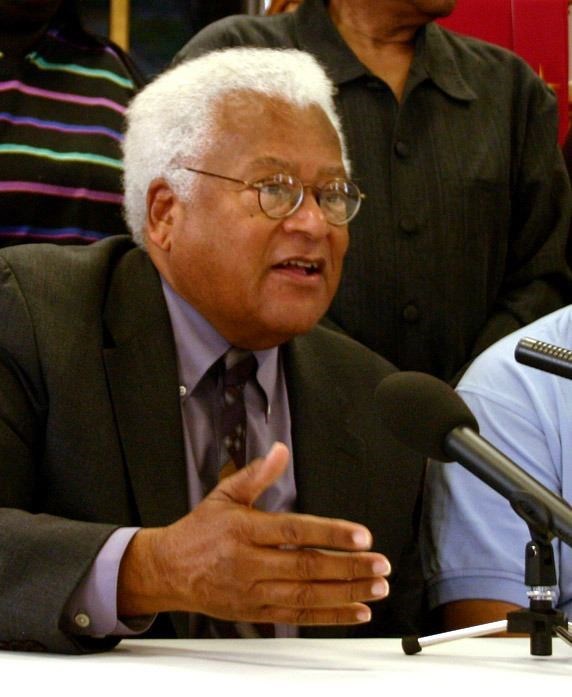Standing up for civil rights
In the 1950s and 1960s, the civil rights movement was occurring. One of the most important activists was James Morris Lawson Jr. James Lawson was born on September 22, 1928, in Uniontown, Pennsylvania, and is still alive to this day and had ten siblings. At the very young age of four, he encountered racial prejudice at the park where he regularly played, like a little white kid yelling slurs at him, but he didn't understand what they meant until he was older. He lived with ten siblings; they helped with the church where James Lawson Sr. was a pastor. Through his fight for civil rights, he showed time and time again his demonstration of moral courage.
 PHOTO: Joon Powell, CC BY 2.5 via Wikimedia Commons
PHOTO: Joon Powell, CC BY 2.5 via Wikimedia Commons
When Lawson was a teen, he was inspired by Mahatma Gandhi, the Indian peace activist. Lawson first encountered him through the African-American newspapers, such as the Pittsburgh Courier and the Cleveland Call and Post. Then, Lawson read Gandhi's autobiography, The Story of My Experiment with Truth. In 1951, the year that Lawson graduated high school, he got his preacher’s license so he could preach at his dad’s (James Morris Lawson Sr) church. Lawson started to work with his father, who was very involved with civil rights acts and helped out the local branches of the NAACP and Urban League. Lawson became more involved in the pacifist cause in an anti-war movement during the start of the Korean War. In 1951, as Lawson was preparing to graduate, he was arrested for refusing to register for the draft. When he got released from prison, Lawson returned to Baldwin-Wallace, completing his AB in 1953. Later that year, Lawson traveled to India and again devoted himself to the study of Gandhi's nonviolent principles.
In 1957, he decided to take action. He enrolled into Vanderbilt Divinity School, opened a Fellowship For Reconciliation field office in Nashville, and started to hold seminars to train volunteers in Gandhian Tactics of nonviolent direct action. Demonstrators from Lawson's group encountered violence from whites and skepticism from other blacks. Lawson convinced other blacks that nonviolence was "deeply rooted in the spirituality of Jesus and the prophetic stories of the Hebrew Bible." For Lawson, the civil rights protest wasn’t a political advantage, “It was a moment in history when God saw fit to call America back from the depths and onto his path of righteousness." As a testimony to his words, Lawson helped plan the Freedom Rides in 1961. In the South, blacks had to sit in the back and whites in the front of the buses. These rides were all about protesting about civil rights and equal pay, from Austin, Texas to Richmond, Virginia. Lawson also participated in the Meredith March in 1966, which was about James Meredith, a black student enlisting into the University of Mississippi, plus, graduating with a degree in political science. It was a march against fear and racism in the south as well. He faced a lot of racism in the university, from racial slurs to getting beaten outside of class, and after he graduated people were celebrating their success, and he held a march and a little while later he got shot by a sniper at the march. Lawson also was working as a pastor at the Centenary Methodist Church in Memphis. Finally, he played a very big role in the sanitation worker’s strike in 1968, which was about blacks getting better pay and work environment. This was one of the first financial protests and justices for sanitation workers.
On the eve of his assassination, Martin Luther King called Lawson “the leader theorist and strategist of nonviolence in the world." After Lawson retired in 1974, he moved to Los Angeles to be a pastor of the Holman Methodist Church. He hosted a weekly call-in, "Lawson Live,¨ where he discussed many different topics like social and human rights, and issues affecting minority communities. He also discussed racism, the Cold War, and military involvement throughout the world.
Lawson impacted the world by fighting for civil rights in the 1950s and 1960s, planning the freedom rides, the Meredith March, the Sanitation strike, and helping Martin Luther King Jr. He also helped protest non-violent actions towards the police and whites, as well as preaching at the Centenary Methodist Church in Memphis.
People still think that the civil rights movement was just that one time, but we still see racism to this day. James Lawson has influenced me to stand up to racism and stand up for people less fortunate.
I’ve come to the conclusion that James Morrison Lawson Jr. has made a very big impact during the civil rights movement, and his impact continues to this day.
Page created on 3/1/2021 5:05:15 PM
Last edited 9/22/2021 9:57:06 PM
